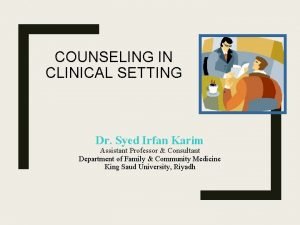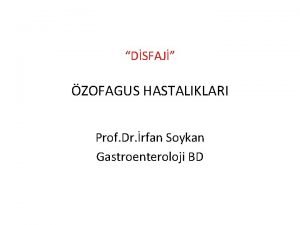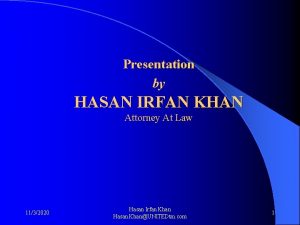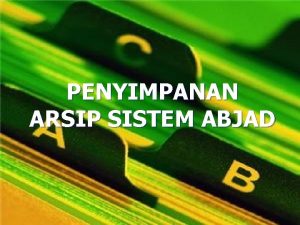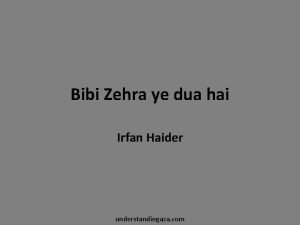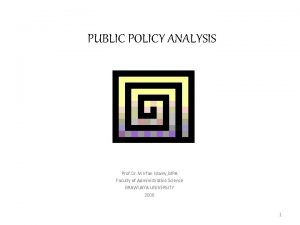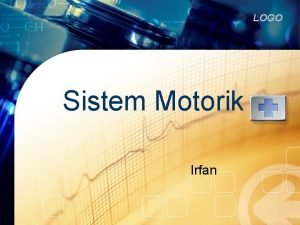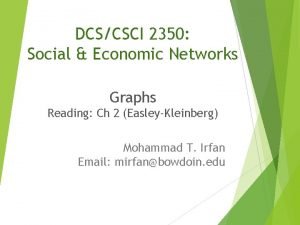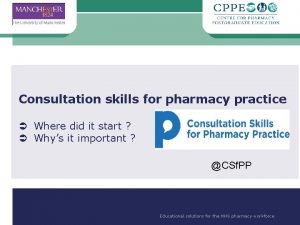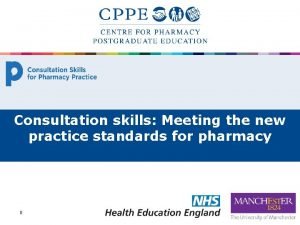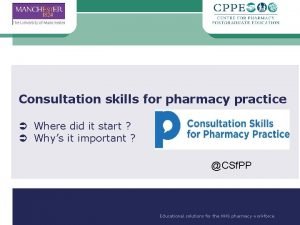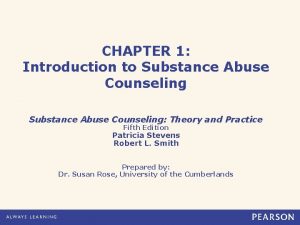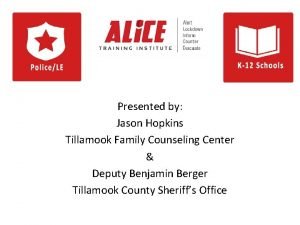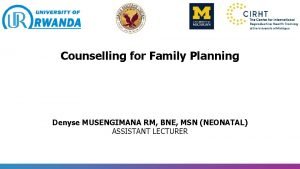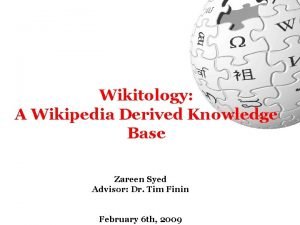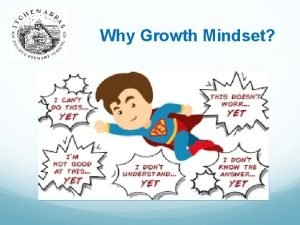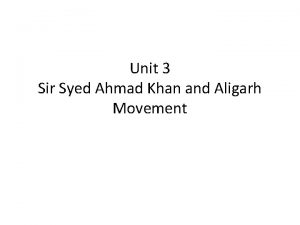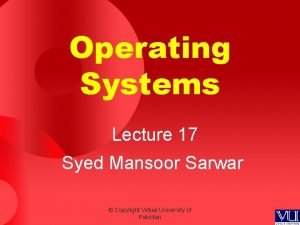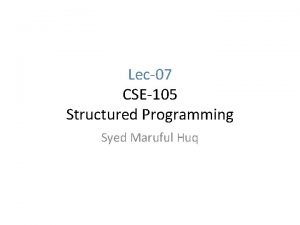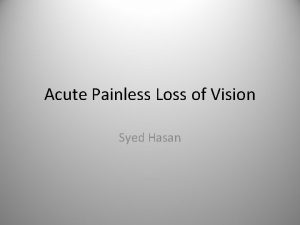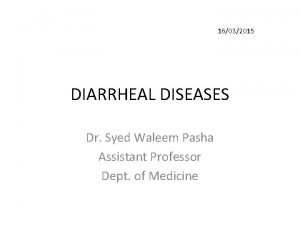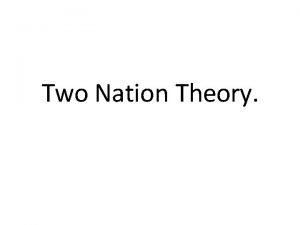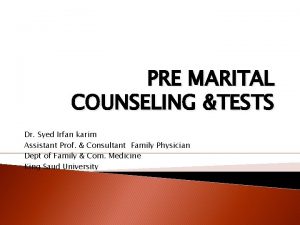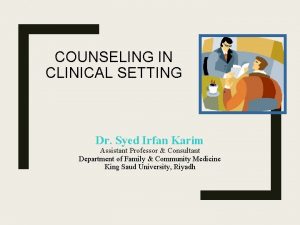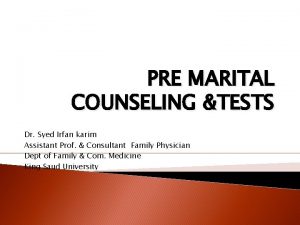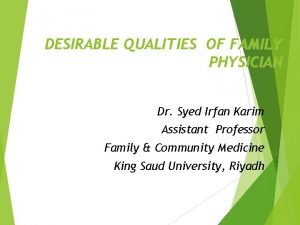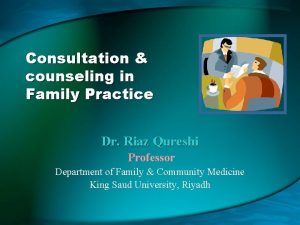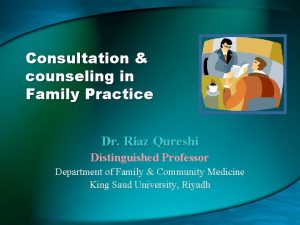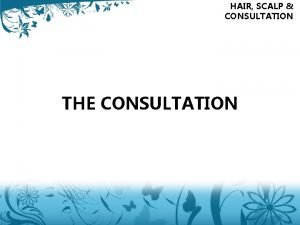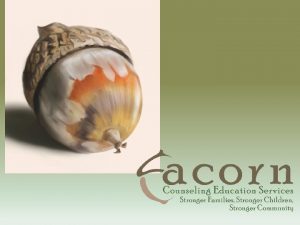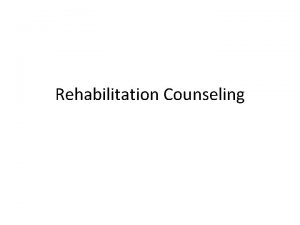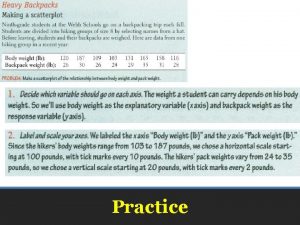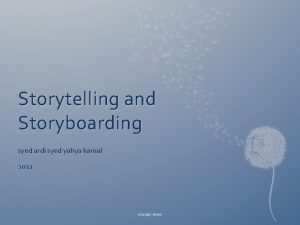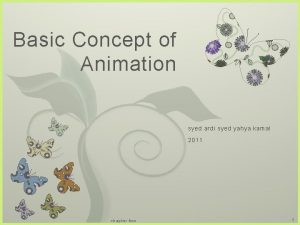Consultation counseling in Family Practice Dr Syed Irfan

























- Slides: 25

Consultation & counseling in Family Practice Dr. Syed Irfan Karim Assistant Professor & Consultant Department of Family & Community Medicine King Saud University, Riyadh Acknowledge to Prof Riaz Qureshi

Objectives : ý To understand the concepts of consultation and counseling ý To learn why are consultation & counseling skills important ? ý To learn theories and stages of counseling ý What are the possible barriers ?


Consultation Skills ý Family Physicians often need to be bearers of the worst imaginable news ý They have to arrange complex and often uncertain information into something understandable ý They have to respond to differing needs of a hugely diverse range of patients and their families ý And they have to do much of this when they are busy and under pressure

What is Counseling? ý It is the skilled and principled use of relationship to help the patient develop selfknowledge, emotional acceptance and growth including personal resources ý Counselors who offer warmth, genuineness and empathy are more effective

What is Counselling ý It is an opportunity to talk to a non- judgmental and supportive person to better understand his/her current problems and identifies strategies to help problem solve.

Theories of Counseling ý Directive: Active or directive counselors tend to interpret, lead and direct their clients ý Non-directive: Non-directive, or reflective counselors tend to elicit and reflect, guide and support their clients

Aims of counseling: ý To help people accept and come to terms with their difficulties and identify ways of coping more effectively and resourcefully ý The counselor listens and asks questions until both counselor and client understand the way the client sees things ý The counselor enables the client to clarify thoughts and feelings for better understanding of the problem

Stages of Counseling ý Exploration: Enabling the patient to explore the problem himself and then focus on specific concerns ý New understanding: To see both, themselves and their situation in new perspectives and how to cope more effectively ý Goal setting ý Action: Possible ways to act ; costs/consequences, planning, implementation and evaluation ; creative thinking, problem solving and decision making

Usual circumstances for counseling ý When the problem in patients life is caused by something that can, t be changed (like job loss or bereavement ) ý Or when u r not sure whether or how you want something to change (like a difficuilt relaytionship in your life). ý Counseling is particularly recommended for adjusting to difficult circumstances

Consultation & Counseling Skills ý If a joint understanding of the problem & management plan, which the patient understands, feels comfortable with, and is prepared to adhere to, is not made: the patient is not likely to follow the advice and all our efforts in assessment and diagnosis are wasted (Silverman et al. 1998)

The Evidence Base Individual Consultation: For the doctor it is one of many routine encounters, something to be got through as fast as possible given the number of other patients waiting to be seen. But for the patient it may be the most important – and stressful – aspect of their week…. or the last six months, as they wait anxiously for the appointment and their chance to see the doctor…… ” (Dr Julie Draper, an unpublished quote, Cambridge University Medical Training Workshop, December 2001)

The Evidence Base contd ý 54% of patient’s problems & concerns not elicited (Stewart et al, 1979) ýDoctors frequently interrupted their patients soon after their opening statement (mean time 18 seconds) so patients subsequently failed to disclose significant (Beckman and Frankel, 1984) ýFailing to discover the patients feelings and concerns led to dysfunctional consultations and counseling (Byrne and Long, 1976)

Deficiencies in Communication &Counseling ý Doctors may not obtain enough information about patients’ perspective ý Provide information in inflexible way ý Pay little attention in checking how well patients have understood ý Less than half of patients’ psychological morbidity is recognized

Blocking Behavior of Doctors ý Offering advice and reassurance before the main problems have been identified ý Explaining away distress as normal ý Attending to physical aspects only ý Switching the topic ý “Jollying” patients along

Reasons for patients not disclosing problems ý Belief that nothing can be done ý Reluctance to burden the Doctor ý Desire not to appear pathetic or ungrateful ý Concern that it is not legitimate to mention them ý Doctors’ blocking behavior ý Worry that their fears about what is wrong with them will be confirmed ý Lack of confidentiality and trust

What is a failed consultation/ Counseling? ý No rapport ý Using medical jargon ý Not exploring the patients agenda ý Not eliciting the actual problem ý No contingency plan ý No summarization ý Failing to clarify ý Not exploring in socio-cultural & economic context

Problems & Limitations in Communication & Counseling: ý Shortage of time ý Language barrier – low literacy ý Firm misconceptions and myths ý Lack of awareness ý Not ready to take responsibility for own illness ý Socio-cultural, economic barriers ý Fatalistic attitude (It’s God’s will)

Barriers to Communication/Counseling in Clinical Practice ý Personal Barriers ý Lack of training: undergraduate/postgraduate ý Undervaluing importance of communication ý Focus only on treating diseases ý Personal Limitations ý Organizational Barriers ý Lack of time ý Pressure of work ý Interruptions

Why Consultation & Counseling Skills? When doctors use consultation & counseling skills effectively: ý Patients’ problems identified more accurately ý Patients more satisfied with their care ý Patients more likely to comply with treatment ý Patients’ distress & vulnerability to anxiety & depression are lessened

Why Consultation / Counseling Skills? When doctors use consultation skills effectively ý Doctors’ and patients wellbeing is improved ý Few clinical errors are made ý Patients are less likely to complain ý Reduced likelihood of doctors being sued Good communication & counseling is good for doctors good for patients and good for the health service

Moving from open to closed questioning The Open-to-Closed Cone Open ended questions to explore the field Mid-way questions – directional statements Closed questions – used following information gathering to focus in

CONSULTATION & COUNSELING Longer duration of consultations and counseling result in lesser prescription of drugs and more patient satisfaction

CONCULSION ý The traditional medical model for consultation and counseling does not recognize the complexity and diversity of the consultation & counseling in family practice. ý Consultation & counseling models are many. Each views the process from a slightly different perspective. ý The consultation & counseling model should match the individual needs of the patients and doctors.

Thank You
 Dr irfan syed
Dr irfan syed özofageal disfaji
özofageal disfaji Dr irfan elahi
Dr irfan elahi Hasan irfan khan
Hasan irfan khan Klasifikasi sistem abjad
Klasifikasi sistem abjad Bibi zehra ye dua
Bibi zehra ye dua Dr muhammad irfan
Dr muhammad irfan Irfan logo
Irfan logo Mohammad irfan bowdoin
Mohammad irfan bowdoin Consultation skills for pharmacy practice
Consultation skills for pharmacy practice Consultationskillsforpharmacy
Consultationskillsforpharmacy Consultation skills for pharmacy practice
Consultation skills for pharmacy practice Substance abuse counseling theory and practice
Substance abuse counseling theory and practice Tillamook family counseling
Tillamook family counseling Gather method of family planning
Gather method of family planning Zareen syed
Zareen syed Matthew syed growth mindset
Matthew syed growth mindset Victoria school ghazipur
Victoria school ghazipur United india patriotic association
United india patriotic association Seyed e. hasnain
Seyed e. hasnain Syed mansoor sarwar
Syed mansoor sarwar Syed maruful huq
Syed maruful huq Importance of ideology
Importance of ideology Sudden painless loss of vision
Sudden painless loss of vision Dr syed waleem pasha
Dr syed waleem pasha Two nation theory in urdu
Two nation theory in urdu
